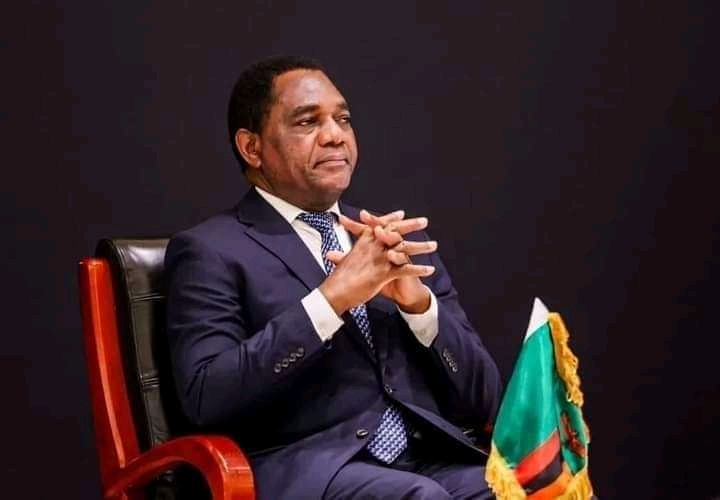COMMENT
The duplicity of Hichilema and his saviour complex
In March 2021, mere months before the August general elections that would eventually see him ascend to the presidency, Hakainde Hichilema took to social media to lambast the then ruling Patriotric Front government’s enactment of the cyber security and cyber crimes Act. Characterising it as a dire threat to free speech, Hichilema promised that upon taking office he would repeal the controversial legislation.
Fast forward three years, the narrative has taken a twist. Rather than dismantling the cyber security Act, Hichilema’s administration now wants to enforce it with unprecedented severity, issuing threats of substantial fines and imprisonment of those found in violation. Doublespeak and deceit best describes Hichilama’s character.
Only a few weeks ago Hichilema was urging the Catholic Church not to criticise his government in public and if at all do so in private. Yet in the years Hichilema spent in opposition he applauded the Catholic Church for its public criticism of the PF government and went to great lengths to seek the support of the Catholic Church. This about-face is emblematic of the broader pattern of betrayal and disillusionment. Hichilema’s presidency has been increasingly marked by contradictions and an alarming disregard for his prior promises, and a troubling inclination towards the very practices he once decried. This is not merely broken promises. It represents a fundamental betrayal of the principles he claimed to uphold. These constant reversals on so many issues calls to question the integrity of Hichilema’s leadership.
While Jack Mwiimbu and Felix Mutati want to “smoke you out”, Hichilema and his ministers should instead begin to smoke out the several known government and UPND sponsored social media groups who are at the forefront of malice and spreading falsehoods. This will be the real test, if not, then as perceived by many its simply government’s attempt to clampdown on free speech and criticism of the government and Hichilema. It seems to many that the UPND and its government like to dish out falsehoods but not accept the same from others. Their falsehoods are sacred, above reproach!
This contradiction is not just a matter of policy but speaks to deeper issues of governance.
On one hand, Hichilema’s government is intensifying efforts to silence critics through legal means. On the other it appears to be orchestrating a sophisticated campaign of misinformation and selective media control. This dual approach not only undermines trust in his administration but also perpetuates the very practices Hichilema once condemned.
Another concerning aspect of Hichilema’s presidency is his tendency to portray himself as the saviour of Zambia. This self-aggrandisement coupled with frequent use of coarse and inflammatory language undermines the dignity of his office and the respect of public discourse. His ill-considered public statements often reflect an egocentric view of leadership where he portrays himself as the sole agent of change and the indispensable figure in Zambia’s political landscape.
Anand Mahindra observed that, “If you aren’t humble, whatever empathy you claim is false and probably results from some arrogance or the desire to control. But true empathy is rooted in humility and the understanding that there are many people with as much to contribute in life as you.”
While Sushma Swaraj warned that, “People can overlook any shortcoming, but they will not tolerate arrogance.”
The use of vulgar language in Hichilema’s political discourse is particularly troubling.
It not only reflects poorly on Hichilema’s character but also sets a dangerous precedent for public communication. Leaders are expected to model respectful and constructive dialogue, yet Hichilema’s rhetoric frequently lapses into crude and divisive language. This behaviour not only erodes public trust but also exacerbates societal divisions, making it harder to foster a cohesive and productive environment.
The cyber security Act debacle is part of a larger pattern of Hichilema reneging on promises. From economic policies to governance reforms, Hichilema’s track record is marred by inconsistencies and broken commitmemts. This pattern raises significant questions about his leadership and the genuine intent behind his campaign promises. Promises related to economic reforms and anti-corruption messures have similarly faltered.
The hope that Hichilema would usher in an era of transparency and accountability has been overshadowed by stark reality of his governance style.
A leader’s character is reflected not only in their policies but also in their ability to align actions with their principles. Hichilema’s presidency unfortunately appears to be characterised by a fundamental disconnect between his professed values and his actual governance practices.
As Hichilema continues to grapple with these issues, it is imperative for Zambians and the international community to hold the UPND administration accountable. Leadership requires more than grand promises and self-serving rhetoric. It demands integrity and consistency. So far inconsistency is an integral part of the new dawn’s policy agenda. They have been inconsistently consistent on matters they loudly condemned the PF over.
The current state of affairs calls for a critical reassesment of Hichilema’s presidency and a renewed focus on ensuring political leaders are held to high standards of accountability and character. The rest of us can become a victim of hubris and Hichilema is a living example of that hubris.
Talking about self-praise, John Madden said: “Self-praise is for losers. Be a winner. Stand for something. Always have class, and be humble.”
